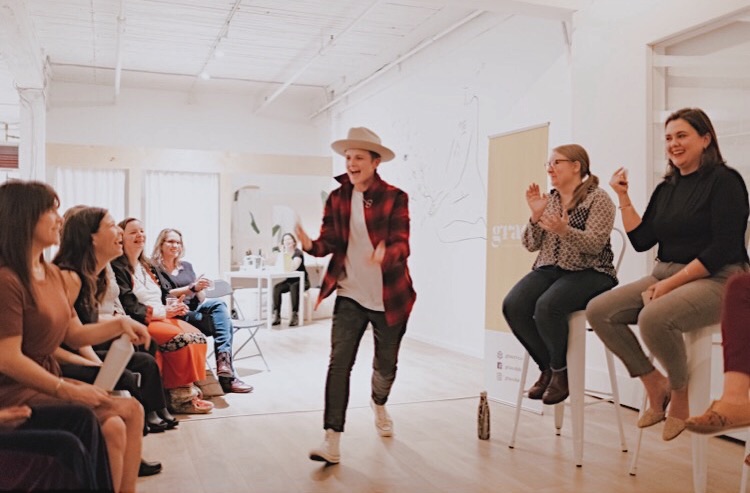Photo from Grace Club’s website.
By Andrea Joy
@ms.andreajoy
Every once in a while, an awakening happens. A surge of understanding that the world is not as it should be sweeps the mainstream. In these moments, there are always people who find they can’t go “back to normal” when the awareness fades from our newsfeeds. They are set on a new path.
That’s what happened with Maggie Anderson, the founder of Grace Club, a curated series of events about everything from decolonized practices to sex to embracing anger and mental health.
In 2017, in the wake of He Who Does Not Deserve to Be Named getting elected in America and the women’s marches that followed, Anderson wanted to carry the energy forward. She wanted to create a space where women could arrive as they were and support one another.
“It started as a women’s thing,” says Anderson on the group she started with her good friend Tavia Cosper. “I used to describe Grace Club as curated content for feminists.”
“I think very quickly I realized, ‘oh, that is me being a white woman, experiencing and identifying with certain branches of feminism that relate to just me,’” she explains. “But what about the people who aren’t like me? And if I’m looking at a ladder of privilege, I’m right there underneath the white men. So what about all the [people we marginalize—BIPOC, LGBTQA2S+, disabled, and folks outside the gender binary?]”
As Anderson’s understanding of her role in society transformed, Grace Club followed.
“The evolution of Grace Club has really been the evolution of my own awareness. And I’m kind of like, ‘Well, if this is news to me and I consider myself a pretty plugged-in, curious, compassionate person, then I bet you it’s news to others. I’ll just take others along with the journey.’”
First, this meant opening up her definition of the people Grace Club served, changing the language about women and womanhood so that people with different gender identities and expressions would feel welcome. Not only did this include trans women, gender nonbinary people and other such expressions of gender, but men, too.
“The last step was saying, ‘okay, we actually need men on board. We need them to have access to these conversations,’” says Anderson. “They have their own deprogramming to go through as well, and if they’re not allowed in these rooms, where are safe spaces for them to learn about how we live under these ruling systems that are super oppressive to men as much as to everyone else.”
Changing Grace Club from a “women’s thing” to something for all people was the first step in Anderson’s journey.

“Very quickly, that evolved into the awareness of, ‘oh, we have racism in Canada,’” expands Anderson. “Which is so silly to say that I started a feminist organization, if you will, without really understanding how complicit we have all been in terms of perpetuating racism. And from an Indigenous point of view, especially, but then more followed suit learning about Black history in Canada. And we really started to dig into anti-racism work.”
The most immediate output of this shift was a change in the Grace Club Instagram account, where feminist memes ran alongside more important and more topical, anti-racist posts. A series of events on decolonizing practices were planned (which got cut off thanks to COVID-19 closures). When planning her events, Anderson took great care in booking diverse speakers, teachers, and leaders.
Through all of this, Grace Club’s online presence has been the documentation of Anderson’s journey. It could be tempting to remove the older posts that Anderson describes as “cringe-worthy,” but she doesn’t want to make it look like her journey has been perfect.
“That fear of fucking up, of making the mistake, of being in the wrong keeps us silent and keeps us complacent,” she explains. “And when we’re complacent, we’re being complicit with the greater narrative. And so this perfection idea is part of the colonial teaching. And my work in decolonizing is realizing that I’m absolutely not going to do this perfectly and few will.”
This evolution, slowly moving forward with curiosity and compassion, using whatever platform one has to amplify those who need it and try to make things better, that’s what makes Grace Club a case study in progress.
Grace Club’s in-person events are on indefinite hiatus until COVID-19 restrictions loosen up. To keep on top of any online events or other initiatives, or to simply keep up with those intersectional feminist memes, follow @graceclubyvr on Instagram.
Editor’s note: Some quotes have been altered for clarity.




